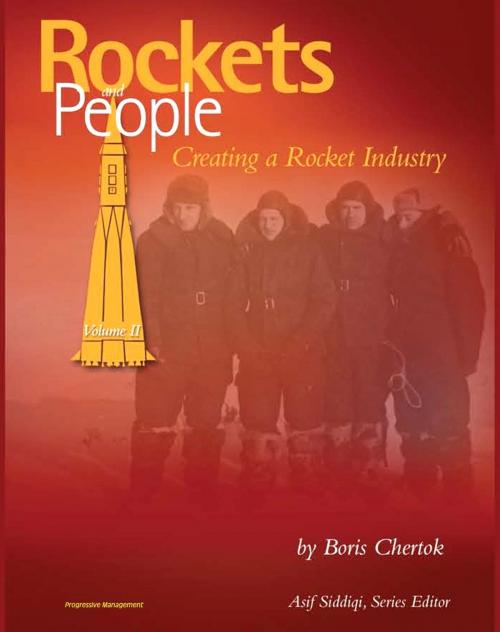Rockets and People, Volume II: Creating a Rocket Industry - Memoirs of Russian Space Pioneer Boris Chertok, Sputnik, Moon, Mars, Launch Pad Disasters, ICBMs (NASA SP-2005-4110)
Nonfiction, Science & Nature, Science, Physics, Astronomy, History, Asian, Russia| Author: | Progressive Management | ISBN: | 9781465905239 |
| Publisher: | Progressive Management | Publication: | December 20, 2011 |
| Imprint: | Smashwords Edition | Language: | English |
| Author: | Progressive Management |
| ISBN: | 9781465905239 |
| Publisher: | Progressive Management |
| Publication: | December 20, 2011 |
| Imprint: | Smashwords Edition |
| Language: | English |
Much has been written in the West on the history of the Soviet space program but few Westerners have read direct first-hand accounts of the men and women who were behind the many Russian accomplishments in exploring space. The memoirs of Academician Boris Chertok, translated from the original Russian, fills that gap. This official NASA history series document has been converted for accurate flowing-text e-book format reproduction.
In this Volume 2, Chertok takes up the story with the development of the world's first intercontinental ballistic missile (ICBM) and ends with the launch of Sputnik and the early Moon, Mars, and Venus probes. His engaging accounts of these dramatic and historic years reveals repeated failures, technical problems, and governmental struggles that marked the opening of the space race in the Soviet Union. An extensive technical discussion provides new details about the tragic Nedelin Disaster in October 1960 which killed over 100 workers attempting to launch an ICBM. Chertok calls it most horrific disaster in the history of missile and space technology.
Contents: Three New Technologies, Three State Committees * The Return * From Usedom Island to Gorodomlya Island * Institute No. 88 and Director Gonor * The Alliance with Science * Department U * Face to Face with the R-1 Missile * The R-1 Missile Goes Into Service * Managers and Colleagues * NII-885 and Other Institutes * Air Defense Missiles * Flying by the Stars * Missiles of the Cold War's First Decade * On the First Missile Submarine * Prologue to Nuclear Strategy * The Seven Problems of the R-7 Missile * The Birth of a Firing Range * 15 May 1957 * No Time for a Breather * Mysterious Illness * Breakthrough into Space * Flight-Development Tests Continue * The R-7 Goes into Service * From Tyuratam to the Hawaiian Islands and Beyond * Lunar Assault * Back at RNII * The Great Merger * First School of Control in Space * Ye-2 Flies to the Moon and We Fly to Koshka * The Beginning of the 1960s * "Onward to Mars...and Venus" * Catastrophes
Chertok began his career as an electrician in 1930 at an aviation factory near Moscow. Twenty-seven years later, he became deputy to the founding figure of the Soviet space program, the mysterious "Chief Designer" Sergey Korolev. Chertok's sixty-year-long career and the many successes and failures of the Soviet space program constitute the core of his memoirs, Rockets and People. In these writings, spread over four volumes, Academician Chertok not only describes and remembers, but also elicits and extracts profound insights from an epic story about a society's quest to explore the cosmos.
NASA issued a statement about the passing of this pioneer: Russian rocket designer Boris Yevseyevich Chertok, one of the founding fathers of the Russian space program, passed away on Dec. 14, 2011 at the age of 99. We share the loss of Boris Chertok with our Russian colleagues," said Bill Gerstenmaier, NASA associate administrator for Human Exploration and Operations. "He was he a spaceflight pioneer and an inspiration to everyone associated with spaceflight. I remember him coming into the control center in Moscow in the middle of the night at the age of 97. He was an inspiration to every flight controller in Moscow. I also remember fondly sitting in Korolev's apartment in Moscow, now a museum, and having Boris describe meetings with Korolev, the general designer, at his kitchen table. The passion in Boris' eyes and voice gave me a unique insight into the Russian team and operations. Boris's speech this year at the 50th anniversary of Gagarin's flight was amazing and awe inspiring. His books and memoirs are a true treasure. He was a friend of NASA and he will be missed. His spirit will live on in the hearts of the Russian and American human spaceflight team."
Much has been written in the West on the history of the Soviet space program but few Westerners have read direct first-hand accounts of the men and women who were behind the many Russian accomplishments in exploring space. The memoirs of Academician Boris Chertok, translated from the original Russian, fills that gap. This official NASA history series document has been converted for accurate flowing-text e-book format reproduction.
In this Volume 2, Chertok takes up the story with the development of the world's first intercontinental ballistic missile (ICBM) and ends with the launch of Sputnik and the early Moon, Mars, and Venus probes. His engaging accounts of these dramatic and historic years reveals repeated failures, technical problems, and governmental struggles that marked the opening of the space race in the Soviet Union. An extensive technical discussion provides new details about the tragic Nedelin Disaster in October 1960 which killed over 100 workers attempting to launch an ICBM. Chertok calls it most horrific disaster in the history of missile and space technology.
Contents: Three New Technologies, Three State Committees * The Return * From Usedom Island to Gorodomlya Island * Institute No. 88 and Director Gonor * The Alliance with Science * Department U * Face to Face with the R-1 Missile * The R-1 Missile Goes Into Service * Managers and Colleagues * NII-885 and Other Institutes * Air Defense Missiles * Flying by the Stars * Missiles of the Cold War's First Decade * On the First Missile Submarine * Prologue to Nuclear Strategy * The Seven Problems of the R-7 Missile * The Birth of a Firing Range * 15 May 1957 * No Time for a Breather * Mysterious Illness * Breakthrough into Space * Flight-Development Tests Continue * The R-7 Goes into Service * From Tyuratam to the Hawaiian Islands and Beyond * Lunar Assault * Back at RNII * The Great Merger * First School of Control in Space * Ye-2 Flies to the Moon and We Fly to Koshka * The Beginning of the 1960s * "Onward to Mars...and Venus" * Catastrophes
Chertok began his career as an electrician in 1930 at an aviation factory near Moscow. Twenty-seven years later, he became deputy to the founding figure of the Soviet space program, the mysterious "Chief Designer" Sergey Korolev. Chertok's sixty-year-long career and the many successes and failures of the Soviet space program constitute the core of his memoirs, Rockets and People. In these writings, spread over four volumes, Academician Chertok not only describes and remembers, but also elicits and extracts profound insights from an epic story about a society's quest to explore the cosmos.
NASA issued a statement about the passing of this pioneer: Russian rocket designer Boris Yevseyevich Chertok, one of the founding fathers of the Russian space program, passed away on Dec. 14, 2011 at the age of 99. We share the loss of Boris Chertok with our Russian colleagues," said Bill Gerstenmaier, NASA associate administrator for Human Exploration and Operations. "He was he a spaceflight pioneer and an inspiration to everyone associated with spaceflight. I remember him coming into the control center in Moscow in the middle of the night at the age of 97. He was an inspiration to every flight controller in Moscow. I also remember fondly sitting in Korolev's apartment in Moscow, now a museum, and having Boris describe meetings with Korolev, the general designer, at his kitchen table. The passion in Boris' eyes and voice gave me a unique insight into the Russian team and operations. Boris's speech this year at the 50th anniversary of Gagarin's flight was amazing and awe inspiring. His books and memoirs are a true treasure. He was a friend of NASA and he will be missed. His spirit will live on in the hearts of the Russian and American human spaceflight team."















